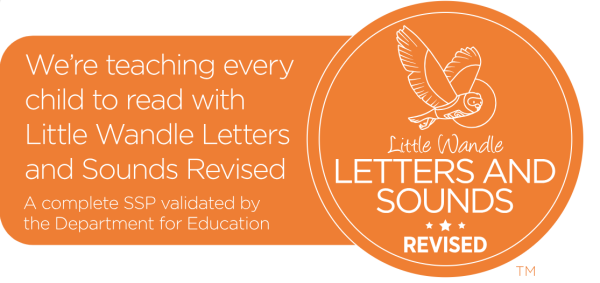Little Wandle

Intent
Phonics (reading and spelling)
At Chalk Ridge School we believe that all our children will become fluent readers and writers. This is why we teach reading through ‘Little Wandle Letters and Sounds Revised,’ which is a systematic and synthetic phonics programme. We start teaching phonics in Reception and follow the ‘Little Wandle Letters and Sounds Revised’ progression, which ensures children build on their growing knowledge of the alphabetic code, mastering phonics to read and spell as they move through school. As a result, all our children are able to tackle any unfamiliar words as they read.
At Chalk Ridge School we also model the application of the alphabetic code through phonics in shared reading and writing, both inside and outside of the phonics lesson and across the curriculum.
Comprehension
At Chalk Ridge School, we value reading as a crucial life skill. By the time children leave us, they read confidently for meaning and regularly enjoy reading for pleasure. Our readers are equipped with the tools to tackle unfamiliar vocabulary. We encourage our children to see themselves as readers for both pleasure and purpose.
Implementation
Daily phonics lessons in Reception and Year 1
We teach phonics for 30 minutes a day. In Reception, we build from 10-minute lessons, with additional daily oral blending games, to the full-length lesson as quickly as possible. Each Friday, we review the week’s teaching to help children become fluent readers.
Children make a strong start in Reception, with teaching beginning in the first full week of the Autumn term. We follow the ‘Little Wandle Letters and Sounds Revised’ expectations of progress (see link below.) Children in Reception are taught to read and spell words using Phase 2 and 3 grapheme, phoneme correspondence (GPCs), and words with adjacent consonants (Phase 4) with fluency and accuracy. Children in Year 1 review Phases 3 and 4 and are taught to read and spell words using Phase 5 GPCs with fluency and accuracy.
Teaching reading: Reading practice
We teach children to read through reading practice sessions three times a week. These are taught by a fully trained adult to small groups of approximately six children. We use books matched to the children’s secure phonic knowledge using the ‘Little Wandle Letters and Sounds Revised’ assessments. These are monitored by the class teacher, who rotates and works with each group on a regular basis.
Each reading practice session has a clear focus, so that the demands of the session do not overload the children’s working memory. The reading practice sessions have been designed to focus on three key reading skills of decoding, prosody and comprehension.
In Reception these sessions start in Week 4. Children who are not yet decoding have daily additional blending practice in small groups, so that they quickly learn to blend and can begin to read books. In Years 2 - 6 we continue to teach reading in this way for any children who still need to practise reading with decodable books.
Home reading
The decodable reading practice book is allocated as an e book and read at home to ensure success is shared with the family. We expect children to read or be read to at least five times a week. This is recorded in their reading diaries.
Ensuring reading for pleasure
Reading for pleasure books also go home for parents to share and read to children. We value reading for pleasure highly and work hard as a school to grow our reading for pleasure pedagogy. We read to children every day. We choose these books carefully as we want children to experience a wide range of books, including books that reflect the children at Chalk Ridge School and our local community as well as books that open windows into other worlds and cultures. Every classroom has an inviting book corner that encourages a love for reading. We curate these books and talk about them to entice children to read a wide range of books.
The school library is made available for classes to use at timetabled slots. Children across the school have regular opportunities to engage with a wide range of Reading for Pleasure events and national events.
Impact
Assessment is used to monitor progress and to identify any child needing additional support as soon as they need it. Assessment for learning is used daily within class to identify children needing keep-up support and weekly in the review lesson to assess gaps, address these immediately and secure fluency of GPCs, words and spellings.
Summative assessment is used every six weeks to assess progress, to identify gaps in learning that need to be addressed, to identify any children needing additional support and to plan the keep-up support that they need.
Children in Year 1 sit the Phonics Screening Check. Any child not passing the check
re-sits it in Year 2. We aim for all children to pass the phonics screening check unless they have an identified SEND barrier. We also expect all children be able to read books fluently and with prosody using their secure phonics knowledge. Along side this we are passionate that children will read for pleasure from an early age.
